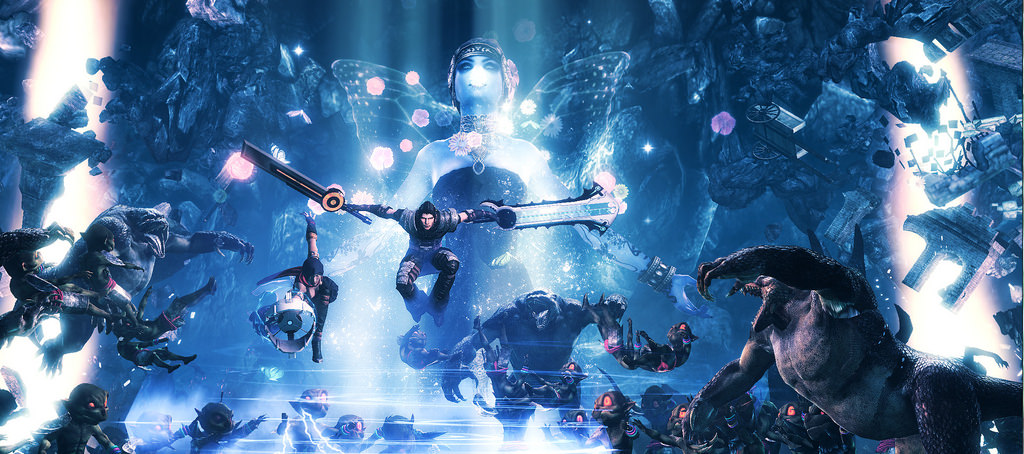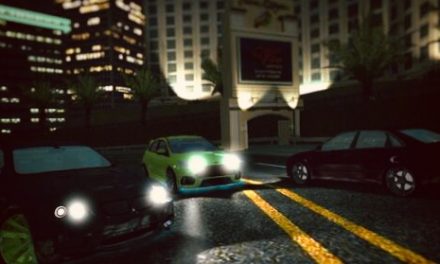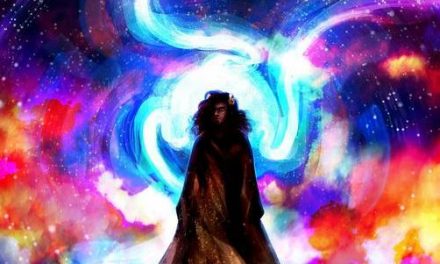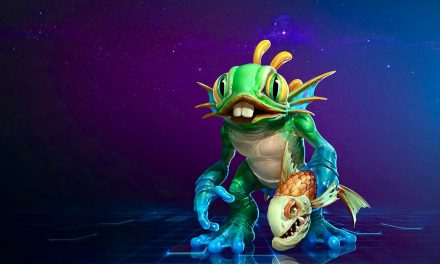More than about any one specific game, today I want to explore how particular methods of exploring a world story create very different connections with the user, drawing on my experience with the games Guild Wars and World of Warcraft for examples. For those who are looking to create interactive gaming experiences, whether online or at the table-top, I hope this post provides some insight into how different presentations can change the relationship with the end product.
I’ve been playing Guild Wars (and its sequel) for more than ten years now, and something that has kept me involved, interested, and engaged with the story is the idea that my character is an integral part of it. Events far outside my control may reshape the world, but the character is an important part of the continuing narrative; at once the character provides battlefield intelligence while also helping world leaders decide on a course of action. Previous deeds are acknowledged and celebrated, and while not everyone may agree with the path you propose, they at least give your words some weight, owing to previous triumphs that were exciting to play through.
In this way, whether the story at hand is about an attempted political assassination, a great dragon waking up and ravaging the land, or even just a farmer trying to defend his farm from bandits, there is a personal connection between the player and the story – their character was involved, perhaps even critical to the story of the game. It breeds both a familiarity and an individualized experience, no matter how many other thousands or millions of characters have gone through the “same” experiences.
Obviously I’m a big fan of the way ArenaNet (the makers of the Guild Wars series) has framed their storytelling, but it wasn’t the first Massively-Multiplayer Online Game I played. That credit goes to Blizzard’s World of Warcraft, back in the pre-expansion days when level 60 was the limit and the newest feature was PvP battlegrounds. Blizzard was telling a very different story than what could be found in many other games, and for all of its flaws, I think they did well.
Their perspective was that not everyone could be a legendary hero – here was a universe at war and wars are fought and won by armies, the boots-on-the-ground soldiers who are more important for their collective weight than individual achievements. Characters had their own unique stories, but the overall tale being told was one of being part of a large, unstoppable conflict that drew in everyone, no matter their social status or standing.
As all games and stories do, World of Warcraft evolved, expanded, and grew with the addition of new realms, new lands, and new lore. At some point, the individual characters were recognized as true heroes, and were put in charge of building up camps and bases from which to wage the continuing war. This is all long after I stopped playing, but it represented a very profound shift in the way their players interacted with the story – instead of acting on behalf of others, now they were given the agency and independence to act as they saw fit, at least from a story perspective. It looked like they had seen the success of games like Guild Wars and wanted to make sure they were keeping pace with modern trends in MMO gaming.
A good friend wanted me to join him and round out his adventuring party and so recently purchased a copy of World of Warcraft: Legion (the latest expansion) for me, along with some items that would boost me to nearly top level. He encouraged me to play through the story of this expansion, both to unlock new areas and to hopefully acquire powerful equipment. What I discovered was quite different from both my experience with Guild Wars and my time in Warcraft almost fifteen years ago.
The player’s character was no longer a simple member of an army, fighting for survival as much as they were for their leaders’ stated aims, but neither was the character an important member of the struggle as had been the case in Guild Wars. Apparently after making characters renowned and powerful entities in their own right in a prior expansion, in Legion they were relegated back to wallflowers with little agency of their own, accomplishing tasks on behalf of others, so that they could gain the glory, power, or prestige on the back of your labors.
I have other reasons for disliking the structure and mechanics of World of Warcraft, but I was genuinely surprised to find the story – and my experience of it – so lacking upon my return. In the beginning my character was a simple cog in a vast war machine, serving a greater purpose out of obligation to my nation as much as out of desire. My character wasn’t responsible for making impactful decisions, because in the very militaristic structure of the environment, it was my job to do as was told and to acquire information, artifacts, or otherwise see others’ plans succeed. Back then it felt like I was playing an everyman, representative of the average experience of creatures in that world, and that was fine.
With Guild Wars, the story wasn’t all about my character, but my character had specific and palpable effects on the story. Taking the lead and commanding others, while still beholden to those above me, it felt like a truly heroic quest that only I could accomplish, serving the greater good as well as protecting the regular citizens of the world.
I reiterate these differences because in World of Warcraft: Legion, I felt like the story had very little to do with the character itself. Here I was, supposedly this world-shaping hero with globe-spanning name recognition, performing what seemed like the most minor of tasks and quests for others. That’s not to say that there weren’t menial adventures in the other scenarios, but here in the same breath I’d be recognized for past bravery and success while being told to collect some flowers or kill a few pesky invaders, pretty much the same things that were happening back at level 1. It’s not so much the content that was the problem, but the presentation thereof. If I’m a huge, big deal, why am I still running the most minor of errands? It really feels like Blizzard couldn’t find a good blend, once they rose the characters to prominence.
What really drove home this feeling though were the cutscenes. After accomplishing a few seemingly minor tasks, with varying levels of difficulty or impact, I would get to watch other characters grow, learn, change, and propel the plot forward. In almost no case did it seem to matter that it had been my character who had made it possible, who had suffered and fought for the victory; everything was about these all-powerful NPCs and it seemed like the story had almost no relation to me as an individual, no matter how much it claimed to.
From my perspective, both early Warcraft and all of Guild Wars did very well at bringing the experience of the world to the player through their characters – in the former by being part of a great whole, and in the latter by truly making them a hero and recognizing their heroics. What I found when I installed World of Warcraft: Legion was a failure to do either, and it leaves me feeling disjointed and unconnected to any of the in-game events. From my perspective, the story is no longer personal because everything interesting happens to other people, I’m just there to facilitate it.
There are many, many people who enjoy the current World of Warcraft expansion, and many people who found that Guild Wars wasn’t quite their speed, and I don’t want to come off like I disapprove of either camp; I wholly recognize and celebrate that there are different games for different people, and that not everyone wants the same things out of their online gaming experiences. From my perspective however, after seeing how well ArenaNet handled the careful balance of character agency it was a real shock to see how poorly (for me) Blizzard attempted the same.
I genuinely enjoy playing with my buddy and his friends, but I won’t be resubscribing, and certainly not purchasing the next expansion, due out at the end of Summer. I need to be able to connect to a game, and there’s just no connection for me with World of Warcraft.














